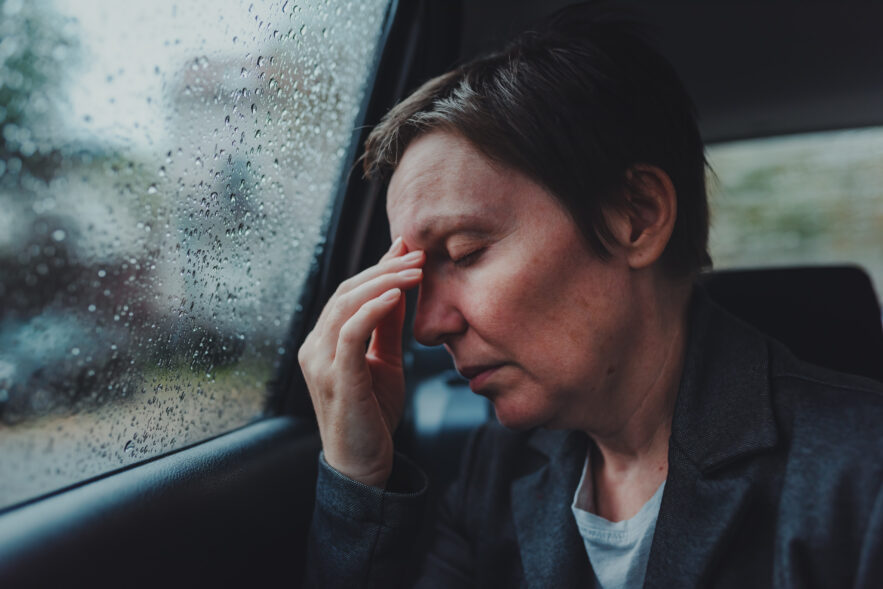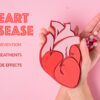Last year, Ankit set sail on a cruise to Alaska. He boarded the boat full of excitement and spent the first afternoon and evening playing volleyball, gorging on dinner, and playing trivia at the bar. The next morning, however, he hardly made it out of the room.
Traveling through the Pacific Ocean, the ship had hit some rough water. He could barely sit up, let alone walk down the hallway for food or recreation. Dramamine couldn’t stop his nausea. After hours of shifting, he found the one and only way he felt better was if he laid across the bed, parallel to the headboard. And there he stayed until the next morning, when the ship made it to calmer waters.
Have you ever stepped onto a cruise, ready to set sail, only to be sidelined an hour later with severe nausea, headaches, or cold sweats? Are road trips in the backseat of the car one of your worst nightmares?
Maybe you’ve even tried some of the motion sickness, fake horizon glasses all over TikTok (the jury is still out on whether or not they work, but some TikTokers swear by them)
@cookiterica Reply to @heyitsrachel27 Motion sickness glasses review #notsponsored #whenimolder #motionsickness #glasses #learnontiktok ♬ So Hot You’re Hurting My Feelings – Caroline Polachek
You’re not alone. Motion sickness is a common and debilitating condition. Luckily, one of the best ways of avoiding motion sickness is by planning ahead.
What Causes Motion Sickness?
Dung Trinh, MD, founder of the Healthy Brain Clinic explains that motion sickness happens when your eyes tell your brain one thing about how you’re moving, but your inner ear, which also senses your body’s position and how it’s moving, tells your brain something different. For example, if you’re sitting in a car, your body is not moving, but your eyes are seeing the scenery pass you by rapidly, you may experience motion sickness.
“The brain gets confused,” says Trinh. Motion sickness is most common when people are traveling in cars or boats.
Almost half of all people reported, in a 2021 survey, feeling motion sickness within the last five years. It may be slightly more common among children and women, and your susceptibility to motion sickness may fluctuate throughout your menstrual cycle, according to a small 2008 study.
The confusion in your brain leads to motion sickness symptoms such as:
- Nausea
- Vomiting
- Drowsiness
- Cold sweats
- Headaches
How Can I Prevent Motion Sickness Without Medication
- Avoid reading or focusing on your cell phone. Since your book or phone is stable, focusing your eyes on it while your body is signaling to your brain that you’re moving can trigger or worsen motion sickness.
- Sitting up front and looking forward. “You want to keep your eyes on the road looking up front and sitting up front,” says Trinh . This helps you realign “your vision with your inner ear.”
- Avoid heavy, fatty meals before activities that might make you sick, says Brandon Lee, who says he’s had “enough practice” to avoid motion sickness. Though some might argue that’s a little harder on a cruise ship with a buffet!
Brian Clark, BSN, a nurse who founded United Medical Education, agrees.
“Anyone with motion sickness should consider lighter meals before starting their journey,“ he says.
- Habituation, or gradually exposing yourself to brief situations that might induce motion sickness, such as a short drive, video game, or virtual reality, to gradually build up your tolerance to it.
- Visuospatial training, or practicing certain tasks such as identifying images objects that have been rotated or folding paper a certain way, for 14 days before traveling may help reduce motion sickness, according to a small 2021 study.
- Gaze stability exercises, or exercises where you practice moving your head while keeping your eyes fixed on a single spot, may help prevent future motion sickness, scientists found in a 2018 study.
What Can I Do After I Start to Experience Motion Sickness?
- Chew gum or eat plain crackers, says Trinh. Having something in your mouth can act as a distraction to alleviate nausea. Ginger and peppermint are also known to help ease nausea. Trinh recommends sipping peppermint tea or ginger ale.
- Turning cool air vents on your face or opening a window can act as an effective distraction from nausea as well.
“It takes your brain off the idea of the movement in the car and refocuses it on the cold stimuli on your face,” Trinh says.
- Acupressure bracelets, which are typically stretchy bands you put around your wrist a harder ball or spot that puts pressure on a point that stimulates your autonomic nervous system, explains Trinh, which can help ease motion sickness.
MedShadow founder, Suzanne Robotti, mentions that traditional acupuncture performed in advance of traveling soothed her symptoms for “six or seven years of travel bliss,” though Trinh emphasizes that typically, he and his patients find the in-the-moment acupressure more effective.
- Breathing exercises: For Lee, just closing his eyes and focusing on his breath is enough to help soothe nausea. Trinh takes it a step farther and recommends using breathing exercises such as counting to four as you inhale, then counting to four again as you exhale.
- If you start to feel dizzy, and you’re able to lay down, Trinh says you can try the Epley maneuver, a technique in which you turn your head, lay back, turn again and sit up, demonstrated in the video below.
Medications for Motion Sickness
Studies show medications are typically helpful only when taken in advance. Little research has evaluated medications taken after you’re already in the boat or car. They’re also well known to cause side effects such as drowsiness.
First-Generation Antihistamines
One of the most well-known medicines for motion sickness, Dramamine, is an antihistamine. Typically newer antihistamines aren’t as effective against motion sickness as older drugs such as:
- Dramamine (dexchlorpheniramine dimenhydrinate)
- Nyquil, Tylenol Cold and Cough Nighttime (doxylamine)
- Benadryl (diphenhydramine)
How Antihistamines Prevent Motion Sickness
All antihistamines block a chemical called histamine that causes your blood vessels to constrict, for example when you have allergies, but the older, first-generation antihistamines also block a neurotransmitter called acetylcholine, which helps signal your body’s position to your inner ear. Drugs that work this way are called anticholinergics, and if you’re over 65, they can raise your risk for confusion, constipation and dry mouth.
Antihistamines reduce the likelihood of motion sickness if you take them prior to getting in the car or boat, but there is little research on whether or not they help if you take them once you’re already moving, a 2022 Cochrane Review of nine randomized controlled trials found.
Kimberly Bliss, MedShadow staffer, shared her conflicting emotions about using Benadryl so her child would sleep through travel to avoid his sometimes violent motion sickness. All three of the aforementioned older antihistamines lead to strong drowsiness, so be sure to be prepared for sleep.
Side Effects of Antihistamines
The most common side effects of first-generation antihistamines are:
- Drowsiness, often severe, so be sure you’re in a safe place to sleep
- Dry mouth
Other side effects may include:
- Constipation
- Dry eyes and skin
- Nausea or abdominal pain
- Low blood pressure
- Increased heart rate
It was thought that these drugs may raise your risk for dementia over time, but while some drugs that block acetylcholine, such as certain types of antidepressants and antipsychotics, did raise the risk of dementia in those that had taken more than 1,000 doses over the course of one to 11 years, antihistamines did not, according to a 2019 study in JAMA. However, many drugs work to block acetylcholine, so you should review all of your medications with your doctor before taking first-generation antihistamines.
Scopolamine
Transderm Scop, known as Scopace, or Maldemar (scopolamine). works by interfering with the messages coming into your inner ear about your body’s movement. A 2011 review of 14 studies suggested it works as well as first-generation antihistamines to reduce nausea caused by motion sickness. Like first generation antihistamines, scopolamine is an anticholinergics meaning if you’re over 65, they can raise your risk for confusion, constipation and dry mouth.
The drug comes in multiple forms:
- Patches you stick on your skin
- Pills
- Injections
Patches are typically the most commonly used form. Trinh says he prescribes them for many of his patients who go on cruises, because it has fewer side effects than other forms of the drug.
“You put this patch behind your ear, and it lasts for three days at a time,” stated Trinh. It takes eight hours for the drug to start being effective, and the effects will last for three days, at which point you’ll need to replace the patch if you are still in a situation that could make you sick (such as on a cruise ship).
Scopolamine pills take about two hours to kick in and only last about six hours after that, so you’ll need to take them more frequently. Again, they’re not known to help unless taken before you start feeling sick.
Side Effects of Scopolamine for Motion Sickness
The most common side effects of scopolamine are:
- Dry mouth
- Drowsiness
But the drugs can also cause:
- Dilated pupils
- Rapid heartbeat
- Dry skin
- Dry nose and throat
It’s possible to overdose on scopolamine. Seek emergency help right away if you experience any of the following symptoms:
- A change in vision (blurriness, inability to see at night, halos around lights, double vision)
- Difficult or painful urination
- Nervousness, anxiety or shaking
- Numbness of the feet, hands or mouth
- Pounding in the ears
- Seizures or loss of consciousness
A few patients have reported experiencing withdrawal symptoms that lasted several days to a week or more, starting 2-3 days after removing a patch that they wore for three days or more. Those symptoms included:
- Nausea
- Headaches
- Blurred vision
- Dizziness
- Low blood pressure
- Tingling in the hands and feet
TikTok user @bog_hag describes her experience with scopolamine withdrawal in this video:
@bog_hag PSA! This isnt an ad or anything its just a heads up. Scopolamine patches work great, and the side effdcts for me (pronounced dry mouth on day 1) are much more tolerable than dramamine. But if you do use them and happen to get rebound symptoms, keep some dramamine on hand! #motionsickness #dramamine #scopolaminewithdrawal ♬ original sound – 🌙Alyssa✨






